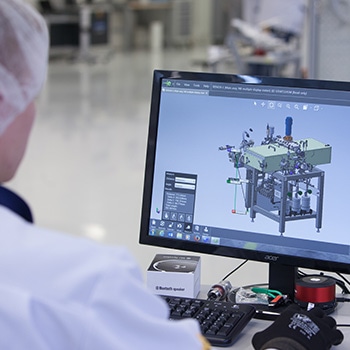Picosun Group, the leading supplier of AGILE ALD® (Atomic Layer Deposition) thin film coating technology, reports excellent results in UVC (ultraviolet-C) LED performance, achieved with the company’s ALD solutions.
Excellent reliability and lifetime improvements of UVC LEDs have been obtained at Picosun’s customer and collaboration partner site, National Chiao Tung University (NCTU), Taiwan, using passivation and barrier films deposited with PICOSUN® ALD equipment*. ALD passivation layer could potentially replace the expensive hermetic seal package of the LEDs and thus lower the costs of the final device.
We have used Picosun’s ALD technology already for years with great success. Our PICOSUN® ALD equipment yields superior quality films which has helped us to achieve several breakthroughs in our LED research. Picosun has local presence in Taiwan and we appreciate the prompt response of their customer support if we ever have any issues. At the phase when R&D results are to be ramped up to industrial-level production, the scalability of Picosun’s ALD technology is a huge benefit.
Professor Hao-Chung Kuo, NCTU

In order to reach maximum light output and long operating lifetime, LED chips require surface passivation to eliminate parasitic currents caused by traps and defects. Also barrier coating is typically needed as LED materials are sensitive to moisture. ALD is an ideal technique to manufacture both the passivation and barrier films – and when the LED size diminishes to micrometer dimensions, the only coating method capable of producing high enough quality films on the required minuscule scale. Ultra-thin, pinhole-free ALD films do not suppress the LED light intensity and they provide reliable protection against ambient conditions, whereas their superior conformality ensures no thickness variations between the facets of the LED chip. Thickness variations, typical side effect of other coating methods, can potentially lead to uneven distribution of film stress or thermal expansion behavior and risk physical damage of the chip.
Short-wavelength UVC radiation destroys bacteria and viruses so UVC LED technology is particularly topical now during the still ongoing COVID-19 pandemic. Small, lightweight LEDs enable versatile design of portable, compact disinfecting equipment, they consume less power than other UVC sources, they are durable, and they pose no risk of hazardous material leaks such as e.g. mercury lamps.
We are happy of the achievements of Professor Kuo’s group at NCTU, and how Picosun’s ALD technology has helped them to achieve their goals in UVC LED development. Our long-term collaboration and networking with both the academia and prominent industries in this field gives us the perfect synergy advantage to facilitate implementation of these solutions in industrial manufacturing.
Mr. Edwin Wu, CEO, Picosun Asia Pte. Ltd.
* UVC LED with 50 nm ALD Al2O3 passivation and normal LED packaging (no hermetic seal) maintained 80% of its original efficiency even after 500 hours environmental test at 85% humidity and 85 oC temperature.